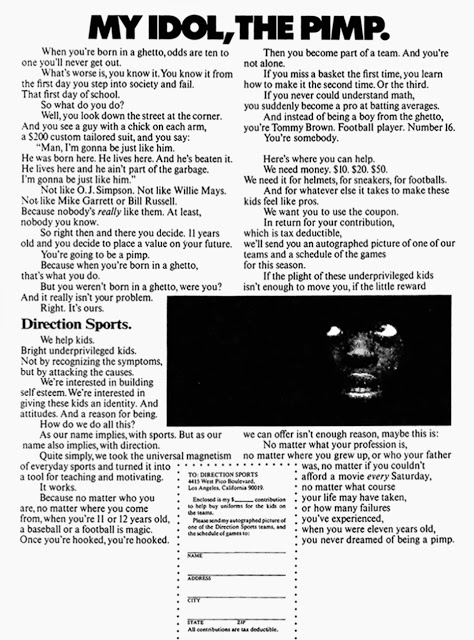Great Copy, Part 4

Copywriter: Steve Garey, Photographer: Greg Booth.
I only came across this ad a couple of weeks ago. My former boss, Duncan Milner, had commented on a LinkedIn post that it was the one that made him realise he wanted to work in advertising.
I took one look and immediately understood why. What a headline. Could you ignore it, especially with that incredible image underneath? No. You’d have to read on and discover who had decided to idolise a pimp and why.
I had a dig around online and tracked it down to this exhaustive Chiat/Day blog, which said it was from 1969, which might explain the line, ‘You see a guy with a chick on each arm, a $200 custom suit, and you say: “Man, I’m going to be just like him…”
But I’m willing to bet that very few of my UK readers are aware of it. In those days most advertising awards were not as international (and homogenised) as they are now, so you got work that was full of local flavour, like this one, written for an LA charity about an LA situation by an LA agency.
And it’s not just the headline. The copy is full of the perfect amount of righteous indignation, understanding the kids and blaming the circumstances, including the people behind the ad. That’s unusual, and unusual things that make sense are more likely to stick in the mind.
There’s a deft turn where, without you noticing, ‘you’ stops referring to the kid and starts referring to the person reading the ad. That takes good writing. As does the ending, where it says, ‘if the little reward we can offer you isn’t enough reason, maybe this is:’, then slides in 42 more conditional words before giving you the ice-cold conclusion: ‘when you were eleven years old you never dreamed of being a pimp’.
It also uses great specificity beyond the geographical location. The amount of money, what that money will be used for, the fact that it’s tax deductible… This isn’t just ‘please donate and your cash will fund a giant corporate charity’; you can now visualise the good things your contribution will bring about: sports gear… to help kids… find some constructive purpose… instead of becoming people who beat up prostitutes for money.
It’s a well-worked, well-rounded, engaging argument that leads you from the dismal situation suggested by the headline to the rational reasons why Direction Sports can do something about it.
I don’t know how many 50-year-old ads still hit this hard, but I think if this ran full-page in a newspaper tomorrow it would generate a lot of conversations and donations.
Maybe just take out the reference to emulating OJ Simpson.